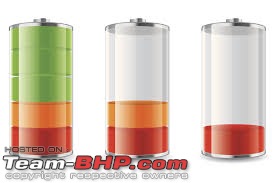Team-BHP
(
https://www.team-bhp.com/forum/)
According to a media report, Qing Tao Energy Development Co. has started a solid-state battery production line in Kunshan, China. It is reported to have an annual capacity of 100 MWh. The company plans to ramp up this capacity to 700 MWh by 2020.
Considered to be the upgrade to the current Lithium-ion (Li-ion) technology, these batteries pack in a higher energy density of 400 Wh/kg compared to the Li-ion's 250-300 Wh/kg. These batteries are expected to allow electric vehicles to have a longer range than those currently offered in the market. Solid-state batteries are also claimed to be safer than Li-ion.
The startup has come from the Tsinghua University and has invested US$ 144 million into the battery production line. Automakers like Toyota, Fisker, Hyundai and BMW all have plans for this solid-state technology with production scheduled to start from 2030.

Source:
Electrek Link to the Team-BHP News
How to store electricity is the barrier we have dealt with since Michael Faraday. The lead-acid was invented in the mid-1800s or thereabouts. This is one of the next big things waiting to be unraveled. I believe, [open to correction] that a lead acid stores about 20 watt hours per kilogramme. One kg of oil equivalent is said to have about 11,600 watt hours of energy. 400 wh/kg is a big step.
Quote:
Originally Posted by V.Narayan
(Post 4501225)
400 wh/kg is a big step.
|
This statement led me to check the specifications for Tesla's Powerwall: 13.5 kWh/125kg so about 108 Wh/kg. The Commercial-spec Powerpacks are about 129 Wh/kg. So, yes, quite a sizeable improvement.
If the ability to store energy sustainably becomes mainstream, countries such as India that are blessed with abundant sunlight should hopefully be able to better manage its energy needs. Politics, permitting of course.
https://www.tesla.com/powerwall https://www.tesla.com/powerpack
I think that solid state batteries are the need of the hour. At our institute,We are working on a "Wind-Energy Based Hybrid Auto-Rickhshaws". The main challenge that we are facing is that we need to optimise between the weight addition due to the batteries and their power output capability, even though we are using the principle of incremental charging and we require the battery to get fully charged only over a standard duty cycle of 8 hours. Solid state batteries will provide savings in weight as well as faster charging times, which in turn can enhance the range of the vehicle per hour in our scenario.
Quote:
Originally Posted by SID2997
(Post 4501377)
I think that solid state batteries are the need of the hour. At our institute,We are working on a "Wind-Energy Based Hybrid Auto-Rickhshaws". The main challenge that we are facing is that we need to optimise between the weight addition due to the batteries and their power output capability, even though we are using the principle of incremental charging and we require the battery to get fully charged only over a standard duty cycle of 8 hours. Solid state batteries will provide savings in weight as well as faster charging times, which in turn can enhance the range of the vehicle per hour in our scenario.
|
"wind-Energy Based Hybrid Auto-Rickhshaws" - Could you elaborate more? How can a vehicle be wind energy based unless it has its own sails? If its some kind of BEV, then how does the source of electricity matter (in the context of naming)?
Quote:
Originally Posted by sreeharipv
(Post 4501400)
"wind-Energy Based Hybrid Auto-Rickhshaws" - Could you elaborate more? How can a vehicle be wind energy based unless it has its own sails? If its some kind of BEV, then how does the source of electricity matter (in the context of naming)?
|
We are using a Vertical Axis Wind Turbine as a means of charging the battery when the vehicle is on the go.When measured in Delhi,considerable wind speeds were achieved when the vehicle runs at 30-40 km/hr.
Quote:
Originally Posted by libranof1987
(Post 4501346)
This statement led me to check the specifications for Tesla's Powerwall: 13.5 kWh/125kg so about 108 Wh/kg. The Commercial-spec Powerpacks are about 129 Wh/kg. So, yes, quite a sizeable improvement.
If the ability to store energy sustainably becomes mainstream, countries such as India that are blessed with abundant sunlight should hopefully be able to better manage its energy needs. Politics, permitting of course. https://www.tesla.com/powerwall https://www.tesla.com/powerpack
|
You do realize the Tesla powerwall has a built in 7kw inverter, AC to DC charger and DC to DC MPPT solar charger, plus enclosure. A typical inverter with electronics and enclosure will weigh over 13kg minimum for transformer less and around 25kg plus for transformer based.
A Tesla esque type LG (I know not panasonic) made 21700 battery already as a 263wh/kg.
Thanks for the inputs gents. I feel that this would first come from China for the simple reason that they are the largest consumer market of electric cars in the world. And nothing like local tech breakthroughs to solve problems they face (or might face). While I'm sure it would take a while for mass market adoption, the Chinese have really been ahead on the electric vehicle front.
The solid-state batteries would enable 1. same range in a smaller form factor (for 2 wheelers) or 2. more range in same size as Li-ion.
Quote:
Originally Posted by SID2997
(Post 4501429)
We are using a Vertical Axis Wind Turbine as a means of charging the battery when the vehicle is on the go.When measured in Delhi,considerable wind speeds were achieved when the vehicle runs at 30-40 km/hr.
|
Could you show a photo of what you are doing? Placing a turbine on a running vehicle will result in more energy lost than what is gained through the turbine. This is a rookie mistake. You are getting a net loss of power by doing this.
| All times are GMT +5.5. The time now is 16:05. | |


